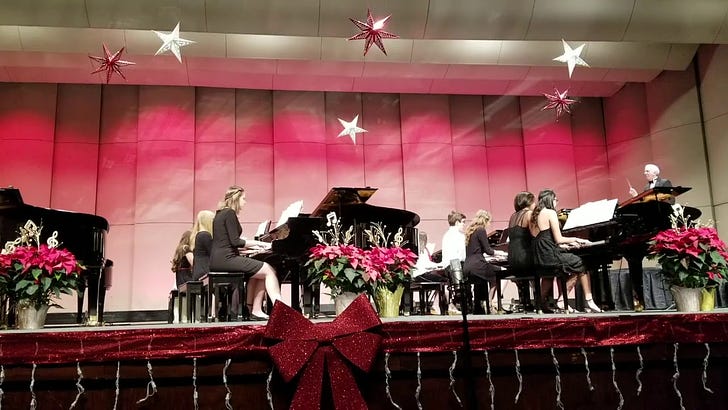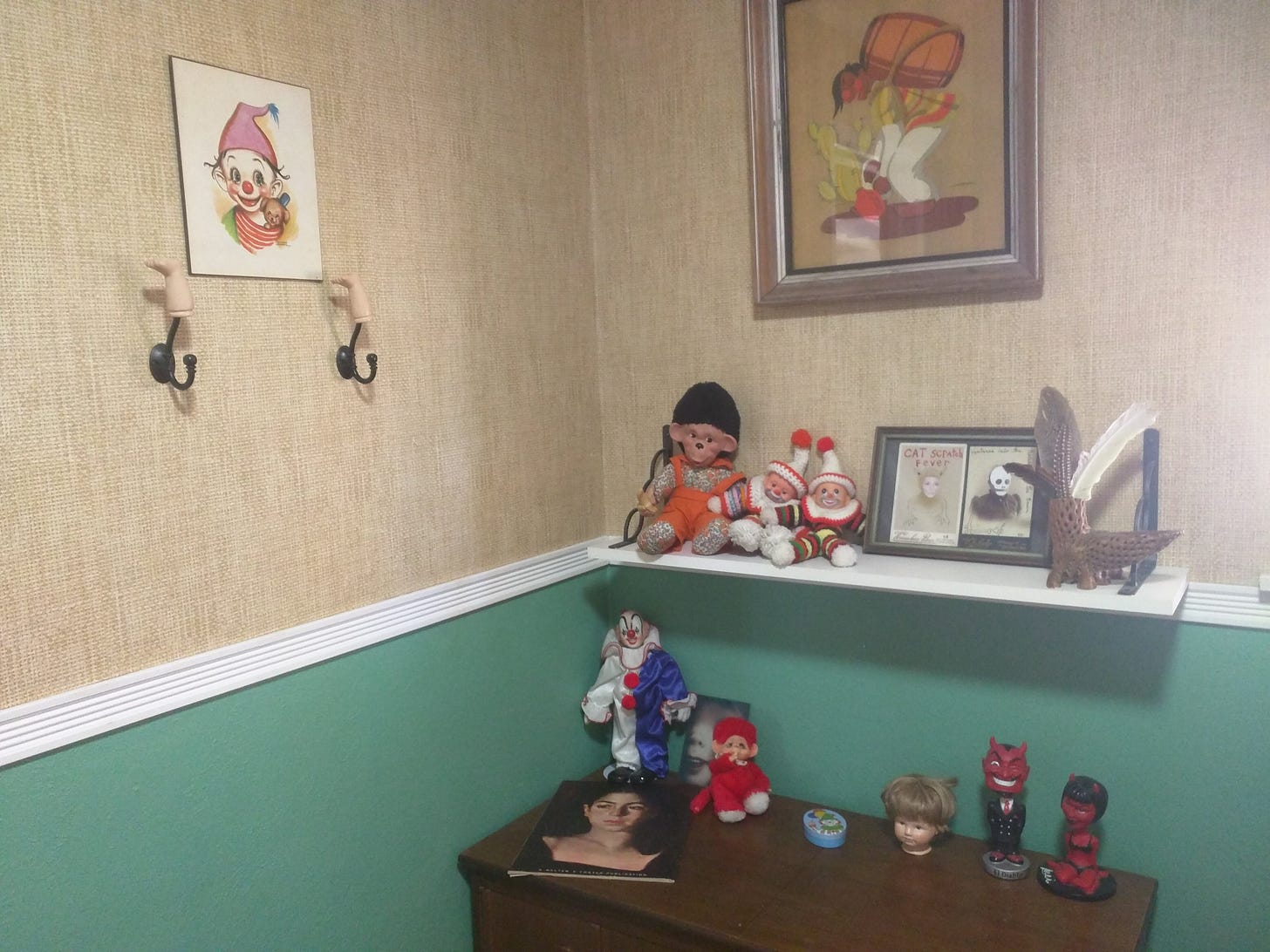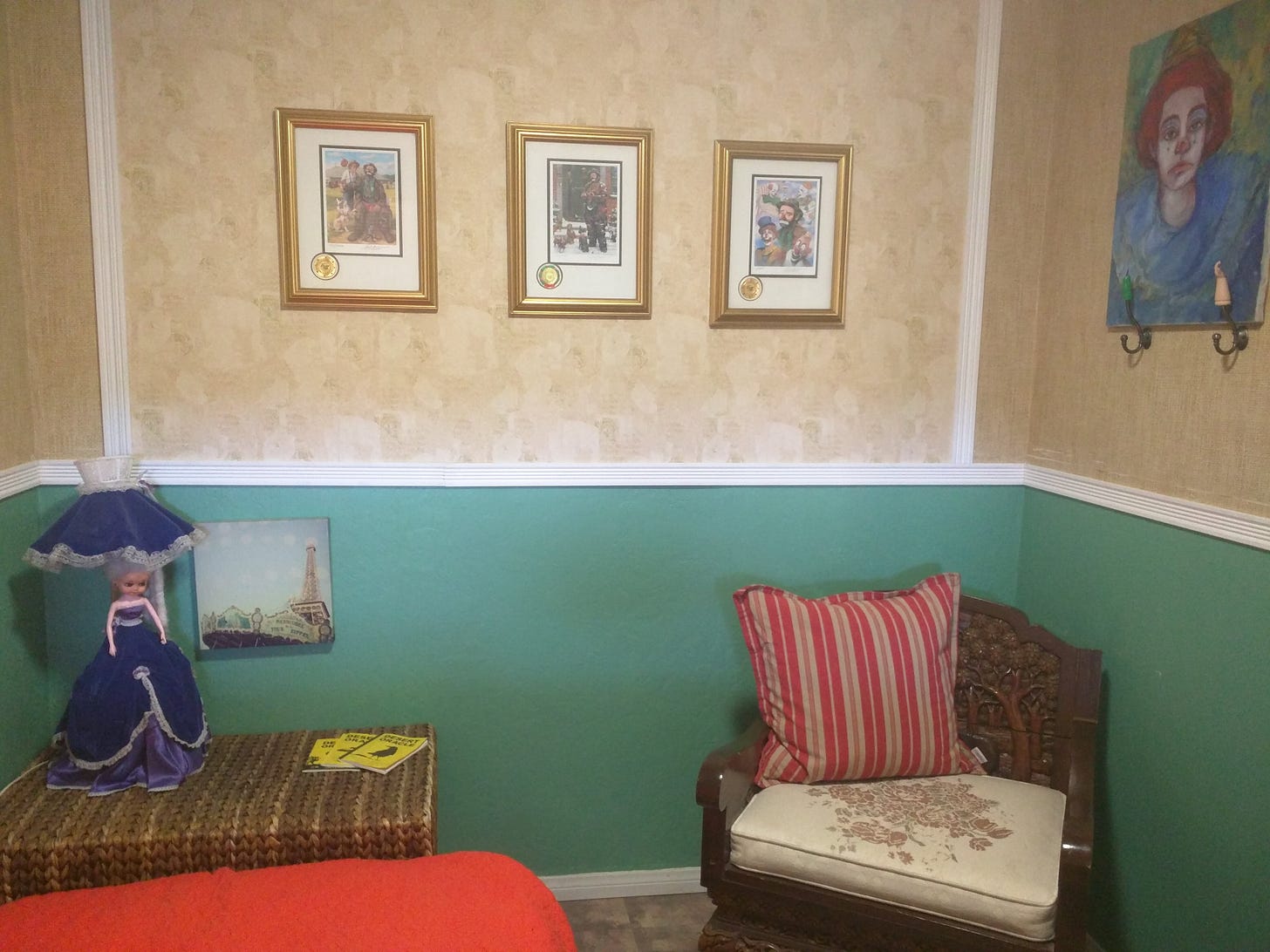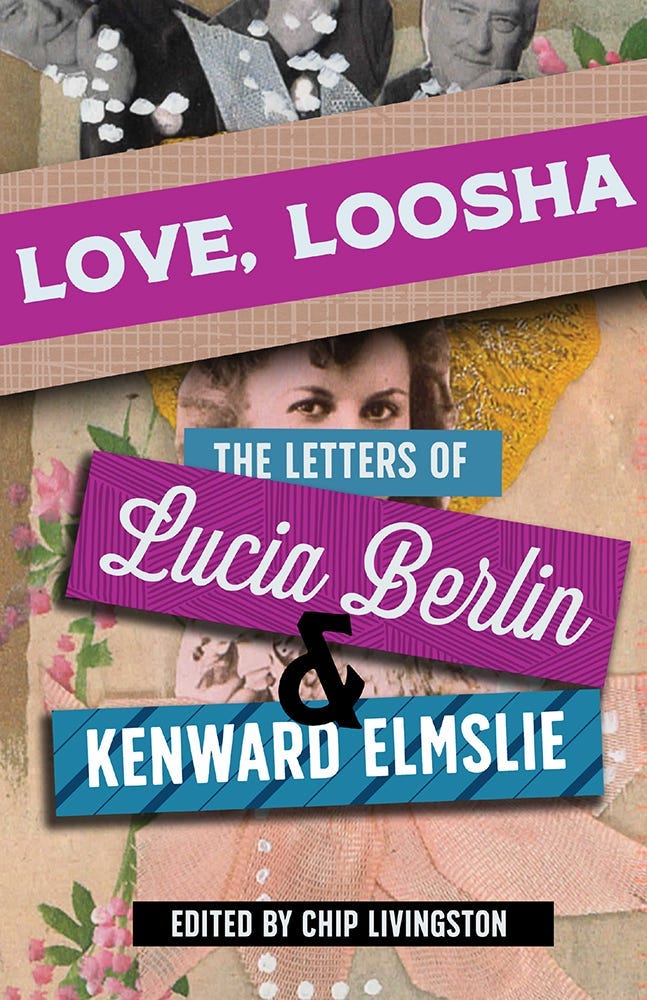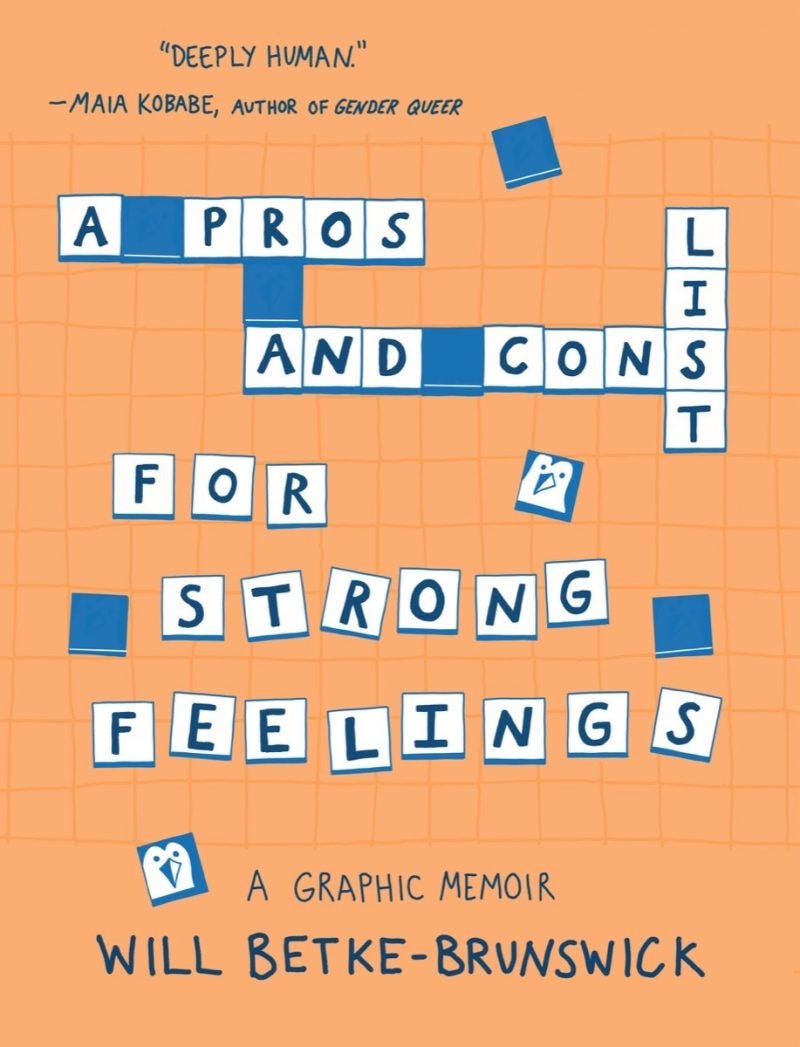Mastering the Art of Collaboration
Why even solitary artists need to learn to work with others, contemplating a cursed, clown-themed Airbnb, and celebrating a new collection of Lucia Berlin's letters.
For the past seven years, November has meant one big event for my family: the Multiple Piano Festival. Picture a brightly-lit stage filled with twelve gleaming grand pianos and 24 pianists playing in unison under the direction of a conductor to form a piano orchestra. My kids’ talented piano teacher, Carol Wickham-Revier, founded the festival more than 35 years ago. MPF didn’t even miss a beat during covid lockdowns, when the organizers managed to synchronize all the musicians’ individual recordings.
Piano students throughout the region start preparing various duets in the summer. Then in early November, they audition to be included. If accepted, they attend several rehearsals and perform on the Saturday before Thanksgiving. It’s a lot of work, and it can be stressful for the pianists to learn their songs with the exactitude the festival demands. But it’s so rewarding, and so beautiful, and it is my favorite kickoff to the holiday season.
Carol founded the festival to transform her students into more versatile musicians. Piano is often a solitary pursuit. You pick your own songs and practice with a private teacher. But if kids want to keep playing piano as they grow up, very often they’re called on to participate as part of an ensemble—playing a keyboard in in a band, or providing accompaniment for musical theater or vocal performance. There’s no way to learn these skills without collaborating with other musicians.
No matter how individual our art form, converting an idea from something we are noodling around with by ourselves in our basements into an expression that will be shared in public and reach (and maybe even move) others almost always requires collaboration. Visual artists must write proposals and appear before arts commissions to secure funding and visibility for their work. Musicians need to come together with others to book gigs, record, and tour. Filmmakers and playwrights rely on a host of collaborators—actors, costume designers, directors—to bring their visions to fruition.
It’s the same for writers. While 85 percent of being a writer is banging out words by yourself like I’m doing at this moment, the fifteen percent of the work that brings those words in front of people involves collaboration. You need your teachers and writing buddies to help you shape up the words until they’re fit to be seen in public. You need the assistance of agents and editors to secure publication. You need book designers, publicists, booksellers, librarians, reviewers, and readers to convince other people to crack open the cover of your book.
Collaboration takes more work, expectation management, and compromise than going it alone does. But it also leads to the most fulfilling expression and dissemination of your creative ideas. Who can you reach out to today to help you achieve your creative goals? And who can you help fulfill their ideas?
The Assorted Whimsy Portion of The Tumbleweed
One of my students wrote a fantastic story this month about a haunted Airbnb, and it reminded me of my own experience of staying in an Airbnb in Joshua Tree that had a “Clown Room.
Let’s pause and make a few observations. The room is dimly lit, so naturally the designer added a headless, armless clown lamp. And has there ever been a more cursed painting than the one above, with a disreputable-looking clown in a tiny hat casting the young girl behind him into deep shadow?
But that’s not all the clown room had to offer. Note the disembodied doll hand coat hooks, various displeased-looking doll heads and devil figurines.
Yep, none of the clowns in any of these paintings seem at all happy. They don’t look as though they wish us well. My kids refused to sleep in the room, which I’m pretty sure meant they passed some kind of self-preservation test you might find in How to Avoid Demon Possession: An Illustrated Guide. We dragged the mattress out for them to sleep in the living room which had nothing more objectionable than cow-themed decor, and high-tailed it out of there after a day.
The Book Recommending Portion of The Tumbleweed
Speaking of artistic collaborations, I’m pleased to recommend Love, Loosha: The Letters of Lucia Berlin and Kenward Elmslie, edited by my friend Chip Livingston, which the University of New Mexico Press published this month. These letters date from 1994, when short story master Lucia Berlin met award-winning poet, editor, and opera librettist Kenward Elmsie while they were both teaching at Naropa University’s summer writing program, and span the years until Lucia’s death in 2004.
Lucia was my teacher, mentor, and friend, and the letters brought her back to me—I could hear her voice and remember her sensibility so clearly. It was an emotional read, so it took me longer than expected to get through it. I kept having to stop to reflect, or just slow down because I didn't want to reach the end. I'm so glad Chip Livingston shepherded this book into the world!
During the years Lucia wrote these letters, she was a virtually unknown writer, publishing with a small press. She was in ill health, trying to sustain herself financially and eke out a little time to write. It would have been so easy for her to give up on her art. But Kenward, who achieved far more acclaim during his lifetime than Lucia did, believed in her. As a New York-based grandson of Joseph Pulitzer, Kenward was able to encourage funding organizations to give Lucia grants. Most importantly, he gave her pep talks. He called her stories “masterful,” and he was right, even though the rest of the world wouldn’t catch up to his assessment of Lucia’s work until after she died.
This book showed me how important it is to support other writers and artists. It shows me the essentiality of believing in your own artistic judgment, and having faith in the worthiness of your own creations. Whether you find success or not, you just might be creating something timeless, of vital importance to readers you have never met. So let’s go out and be Kenwards and Lucias for our fellow creative souls. If someone’s work inspires you, let them know. Your voice might be the nudge of encouragement they need to keep going.
The Community Happenings Portion of The Tumbleweed
Today is the one-year anniversary of Mixed Company being out in the world! This book has exceeded my wildest expectations. First, it was a pleasant surprise it got published at all, after I started sending it out on a whim during a spate of pandemic-induced ennui. Second, it won the George Garrett Prize and, somehow, the Colorado Book Award for General Fiction. And third, it went into a second printing. I am thankful for all of you who have read, recommended, and rated it on the book-hawking site of your choice.
And in the spirit of creative collaboration, I want to expand this last section of The Tumbleweed from being merely self-promotional into becoming a writing community message board. When I was the Books Editor at NewWest, I had a column every week called the Western Book Roundup, sharing all the literary news I could find from this region. Let me know if you have a publication or event to tell people about, and I’ll do my best to share it here. You can leave a comment or send me an email.
If you’re reading this today, November 15, you are just in the nick of time to head to the Boulder Book Store for the launch of A Pros and Cons List for Strong Feelings, the debut book by Boulder graphic memoirist Will Betke-Brunswick. Will will discuss the book with Kelly Shortandqueer starting at 6:30. Tickets are $5 but they work as a $5 off coupon at the store and you weren’t actually thinking you’d make it out of a delightful bookstore without buying something, were you?
Maybe just camp out at the Boulder Book Store, because on November 16 my Mile High MFA colleague Erika T. Wurth will be reading from her new novel White Horse. Erika is tearing it up—White Horse is featured as the best November book on Apple Books, it’s a Book of the Month Club pick, it’s a Target Book Club pick, and got a fantastic review in the New York Times.
Talented Denver writer Stephanie Vessely, who I met when she was a student at the Mile High MFA, is editing a nonfiction anthology on the theme of women’s reproductive health for Fulcrum Press. Check out the guidelines and submit your creative nonfiction pieces in by December 17.
I’m so excited to celebrate the launch of Love, Loosha with its editor Chip Livingston and my fellow student-of-Lucia Erika Krouse on December 14. Join the free Zoom book launch by registering through Lighthouse Writers Workshop.
I reviewed Ryan Lee Wong’s debut novel Which Side Are You On, in which an idealistic college student plans to drop out to focus on community organizing, while his old-school Asian activist parents try to dissuade him, for the Minneapolis Star Tribune.
This is the coolest thing: Rachel King is touring to tell people about her new, acclaimed story collection Bratwurst Haven, and she was kind enough to invite three fellow short story writers with recent collections set in Colorado along for the ride. Wendy J. Fox (What if We Were Somewhere Else), Claire Boyles (Site Fidelity), and I (Mixed Company—you didn’t forget, did you?) will join Rachel in conversation at the Boulder Book Store on February 9 and at Tattered Cover Colfax on February 10.
